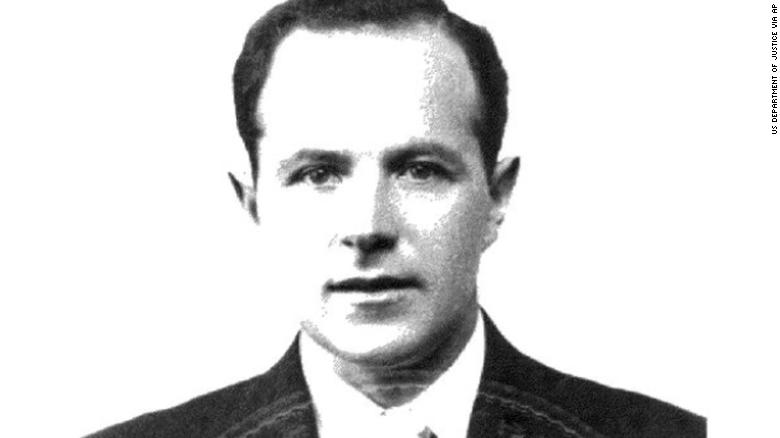Too Little, Too Late -- Holocaust Justice
"I don't know how he [Trump] learned of the case, but it was very clear that he knew this individual as a Nazi guard and wanted him out of the United States."
"[The Germans] saw this as a moral obligation that they had, not so much a legal obligation."
U.S. Ambassador to Germany Richard Grenell
"All of my five predecessors assumed that they'd be the last person in this office."
"In recent years, though, we've made some remarkable progress."
"I don't take those papers [thousands of file cards replete with Nazi criminal details] home with me. I just wouldn't be able to let it go."
Jens Rommel, Chief prosecutor for Nazi crimes, Germany
 |
| In this Monday, Aug. 20, 2018, frame from video, Jakiw Palij, a former Nazi concentration camp guard, is carried on a stretcher from his home in the Queens borough of New York. Palij, the last Nazi war crimes suspect facing deportation from the U.S. was taken from his home and spirited early Tuesday morning to Germany, the White House said. (ABC via AP) (Associated Press) |
Up to a few years ago German war crime prosecutors faced prosecution hurdles making it impossible to charge suspects who had participated in Nazi Germany's "Final Solution" and the operation of slave labour and death camps. "By 1960, murder and abetting murder were the only Nazi-era crimes that prosecutors could charge", explained Elizabeth Barry White, senior historian with the Holocaust Memorial Museum in Washington.
Under the stricture of these guidelines high-ranking Nazi officials were charged if at all with lesser offences since it could not be proven in a court of law that they had direct responsibility for the murder of one or more individuals, based on the narrow German prosecution guidelines. Most frequently, lower-ranking guards or soldiers who took part in the Nazi extermination machinery of Jews, gypsies, gays, the mentally and physically challenged, and political prisoners got off free.
In 2011, after a court convicted former Nazi guard John Demjanjuk, the matter finally changed where the recognition was raised of soldiers or guards' presence at a Nazi death camp would be considered evidence of responsibility for the murders, unlike prior to 2011 when prosecutors had to provide evidence that the guards themselves murdered Jews or others held in the death camps.
At a time when many of those involved in the scheme to exterminate all of Europe's Jews have died after living out their lives post-Holocaust, or are now close to death, a mockery was made of holding those involved to account for the millions who perished over 70 years ago, leaving tens of thousands of Nazi criminal involved directly in the Holocaust, to simply melt into the general population and live out their lifespans without fear of apprehension.
While some of these ex Nazis made their way abroad, others simply remained in the country of their birth, with few facing justice. Of late, however, 23 alleged Nazi criminals believed to have worked in the death camps are now facing charges in Germany and Austria; a pitiful number, but a dramatic increase when considering previous decades when nothing was done to call Nazi criminals to account.
Early this week the White House announced the deportation of 95-year-old New York resident Jakiw Palij, known to have been a Nazi guard, but living post-war in the United States. Arrested and deported to Germany, Palij on arrival in Germany was placed in a nursing home in Dusseldorf. Born in what was then a part of Poland now part of Ukraine, he left Europe for the U.S. at war's end and became a citizen in 1957, never having declared details of his past.
For whatever reason, in 2001 the man spoke of his involvement with the Nazi SS, the paramilitary organization of Nazi Germany, complicit in carrying out Hitler's orders of Jewish extermination. Documents are in hand proving that Palij knew of, and participated in the Holocaust. He was trained at the SS paramilitary camp in the town of Trawniki with units prepared specifically to take part in the Holocaust. He worked as well at Trawniki labour camp the year Nazis massacred 6,000 Jews there.
His citizenship was revoked, though Palij protested that while he was present he hadn't participated in any of the killings. He lost an appeals process in 2005, but the problem of which country would claim him for deportation remained unresolved until recently; neither Germany, Ukraine nor Poland would accept Palij. Germany finally relented on the basis that it was Germany that planned and executed the Holocaust.
Palij is now among two dozen Nazi suspects now under investigation by the Nazi crimes agency based in Ludwigsburg all of whom are in their 90s, some expected to die before any sentencing, or who could be declared unfit to stand trial.
"Palij will spend the rest of his life here. The Nazi collaborator will now be cared for, receive financial help, a roof, food, clothing, paid for by the state."
"Even though there is not enough evidence to prosecute him, nevertheless it is good that Germany has taken him in, because the crimes of national socialism bring with them responsibility ... after all, were it not for the Germans, Palij would never have become a Nazi collaborator."
editorial in the left-leaning Taz
 |
| Jakiw Palij, pictured in 1957. Photograph courtesy US Justice Department |
Labels: Holocaust, Nazi Germany

<< Home